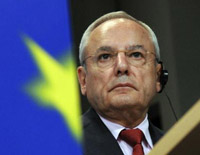EU faces a stormy autumn over refugee-sharing plans
 Brussels - This autumn could be a stormy one in Brussels.
Brussels - This autumn could be a stormy one in Brussels.
On Monday, European Union member states began discussing proposals to set up a new, coordinated system for taking in and sharing out refugees from some of the world's most troubled regions.
Judging by their first comments, the debate might not be easy.
"It's the duty of each member state to participate," EU Justice Commissioner Jacques Barrot said as he presented the proposals from the bloc's executive.
But "there should be no limit to (national capitals') ability to choose" when, how and if they take in refugees, Czech deputy interior minister Lenka Ptackova Melicharova stressed as she debated the proposals with her counterparts.
At present, each EU state decides for itself who counts as a refugee and what treatment they should receive. That means that the same person could be welcomed as an asylum seeker in one country and rejected as an illegal immigrant in its neighbour.
That system is frankly "dysfunctional," United Nations High Commissioner for Refugees Antonio Guterres said.
The commission, the EU's executive, wants member states to replace it with a joint scheme to identify the most vulnerable refugees around the world and offer them a home.
While participation in the scheme would be voluntary, Barrot left no doubt as to his feelings about the project.
"Europe's values give it the duty to take in the world's persecuted people," he underlined.
But few ministers endorsed that view as they lined up to trumpet the importance of national independence.
"Participation must be voluntary. That should not be undermined by any obligation to explain the grounds for non-participation," Austria's minister, Maria Theresia Fekter, said.
EU members are deeply divided over the question of how urgent an issue migration is. Front-line states such as Malta and Cyprus see it as the most pressing challenge they face.
"Our structures cannot cope with the pressures," the secretary general of the Greek interior ministry, Patrocios Georgiadis, said as he called for a law which "went beyond a voluntary basis."
But countries which are further away from the immigration front line are more concerned with getting out of the economic crisis than taking in refugees - even though the commission has proposed a 4,000-euro (5,900-dollar) aid package to accompany each migrant.
Strong financial backing is a "precondition for any reinforcement of resettlement," Melicharova stressed.
Even Luxembourg, the EU's richest state in per-capita terms, has "limited resources" to take in refugees, "because of the size of our country," interior minister Nicolas Schmit said.
While the EU's traditional power-brokers, Britain, Germany and France, argued that solidarity is important, they also said that they are already doing their part.
"Germany has taken in more refugees than any other country," Interior Minister Wolfgang Schaeuble pointed out.
And Fekter went even further, warning that some of the refugees might be a direct threat to their new home.
"We have to avoid the negative effects, such as fundamentalism and conflicts which we could import into our countries," she said.
It all leaves the commission and Sweden, current holder of the EU's rotating presidency, with a mountain to climb as they push for a deal on the common resettlement policy.
Monday's debate was the first on the issue. It is not likely to be the last. dpa